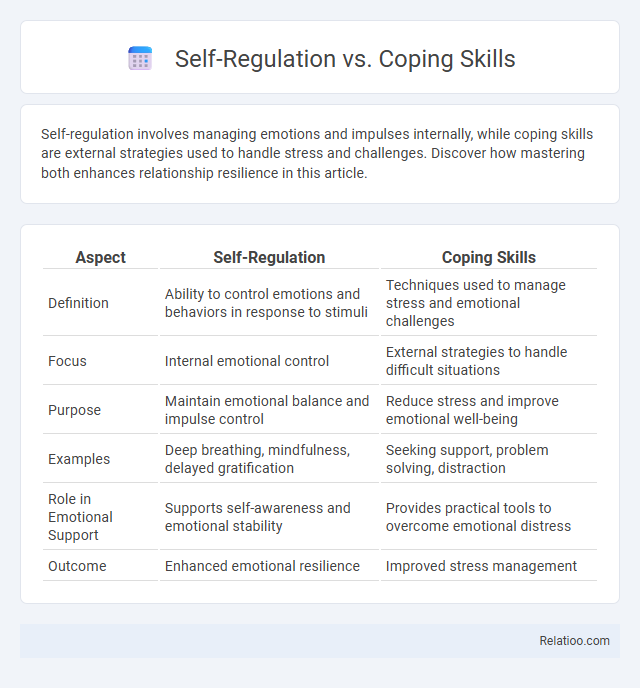Self-regulation involves managing emotions and impulses internally, while coping skills are external strategies used to handle stress and challenges. Discover how mastering both enhances relationship resilience in this article.
Table of Comparison
| Aspect | Self-Regulation | Coping Skills |
|---|---|---|
| Definition | Ability to control emotions and behaviors in response to stimuli | Techniques used to manage stress and emotional challenges |
| Focus | Internal emotional control | External strategies to handle difficult situations |
| Purpose | Maintain emotional balance and impulse control | Reduce stress and improve emotional well-being |
| Examples | Deep breathing, mindfulness, delayed gratification | Seeking support, problem solving, distraction |
| Role in Emotional Support | Supports self-awareness and emotional stability | Provides practical tools to overcome emotional distress |
| Outcome | Enhanced emotional resilience | Improved stress management |
Understanding Self-Regulation
Understanding self-regulation involves managing your emotions, thoughts, and behaviors to achieve long-term goals and maintain mental well-being. Self-regulation differs from coping skills, which are specific strategies used to handle stress and immediate challenges, while self-regulation embodies a broader, ongoing process of control and adjustment. Developing self-regulation enhances your ability to respond adaptively to various situations, promoting resilience and emotional balance.
Defining Coping Skills
Coping skills refer to the specific strategies and techniques individuals use to manage stress, emotions, and challenging situations effectively. Unlike self-regulation, which involves the broader ability to control impulses and maintain emotional balance, coping skills are actionable methods such as problem-solving, relaxation, and seeking support. Your ability to develop strong coping skills directly enhances resilience and emotional well-being.
Key Differences Between Self-Regulation and Coping Skills
Self-regulation involves managing your emotions, thoughts, and behaviors proactively to achieve long-term goals, while coping skills are specific strategies used to handle stress or challenging situations in the moment. Self-regulation emphasizes control and adjustment before an issue arises, whereas coping skills focus on reacting effectively during or after stressful events. Understanding these distinctions helps You develop both immediate stress responses and sustainable emotional management for overall well-being.
The Science Behind Self-Regulation
Self-regulation involves the brain's executive functions to manage emotions, behavior, and attention through prefrontal cortex activity, enabling individuals to control impulses and sustain goal-directed actions. Coping skills are specific strategies employed to handle stressors, distinct from self-regulation's ongoing internal management system but interconnected in managing emotional responses. Neuroscientific research highlights that strengthening self-regulation enhances cognitive flexibility and emotional resilience, underpinning long-term mental health and adaptive coping mechanisms.
Types of Coping Skills
Self-regulation involves managing your emotions and behaviors, while coping skills specifically address how you handle stress and challenges. Types of coping skills include problem-focused coping, which tackles the source of stress directly, emotion-focused coping that manages emotional responses, and avoidant coping that evades the problem temporarily. Developing diverse coping skills enhances your ability to maintain self-regulation under pressure and improve overall mental resilience.
Benefits of Strong Self-Regulation
Strong self-regulation enhances your ability to manage emotions, maintain focus, and achieve long-term goals, which directly improves mental resilience and productivity. Unlike basic coping skills that address immediate stress, self-regulation equips you with proactive strategies to control impulses and make thoughtful decisions. Developing robust self-regulation fosters emotional intelligence, reduces anxiety, and supports sustained personal and professional growth.
How Coping Skills Impact Mental Health
Coping skills are crucial in managing stress and emotional challenges, directly influencing your mental health by reducing anxiety and promoting resilience. Effective coping mechanisms enable better self-regulation, allowing you to maintain emotional balance and respond adaptively to adverse situations. Strengthening coping skills supports overall mental well-being by enhancing your ability to control impulses and regulate emotions.
Strategies to Improve Self-Regulation
Effective self-regulation strategies include mindfulness meditation, cognitive reframing, and goal-setting techniques that enhance emotional control and decision-making. Coping skills focus on managing stress and emotional responses through relaxation exercises, problem-solving, and social support, differing from self-regulation by emphasizing reactive rather than proactive approaches. Improving self-regulation requires consistent practice of techniques like impulse control, delaying gratification, and maintaining attention, which strengthen executive functions and promote long-term behavioral change.
Developing Effective Coping Mechanisms
Self-regulation involves managing your emotions and impulses to maintain control in challenging situations, while coping skills refer to specific strategies you use to handle stress and adversity effectively. Developing effective coping mechanisms requires a strong foundation in self-regulation to enhance emotional resilience and problem-solving abilities. Integrating self-regulation with diverse coping skills empowers you to adapt to difficulties and maintain overall mental well-being.
Integrating Self-Regulation and Coping Skills for Well-Being
Integrating self-regulation and coping skills enhances emotional resilience by enabling individuals to manage stress effectively and maintain mental balance. Self-regulation involves controlling impulses and emotions to achieve long-term goals, while coping skills are specific strategies used to handle immediate challenges and stressors. Combining these approaches fosters adaptive responses, promoting overall well-being and psychological health.

Infographic: Self-regulation vs Coping skills
 relatioo.com
relatioo.com